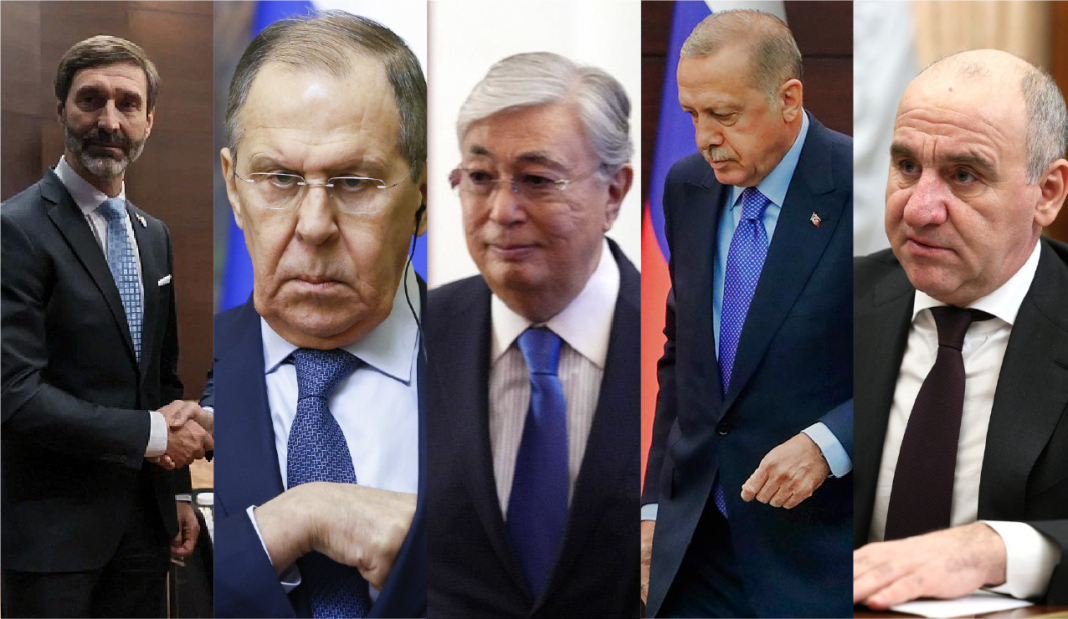This report describes the key events which significantly influenced Russia’s political, economic, and social processes.
Assessing the past week’s results, we determine the following trends:
- Russia is indeed preparing for a breakthrough in its space programs – even if the project to place nuclear weapons in space, which the US accuses Russia of having, turns out to be a bluff. Space programs and the transfer of confrontation into space, as well as the placement in low-Earth orbit of equipment that allows influencing the situation on earth, is an essential element of the immediate agenda for Russia. This factor is important to study because it poses a severe threat to the West and takes the arms race to an entirely new level.
- Tokayev is one of Putin’s most important allies today, and he has an important function: he acts as a de facto mediator and lawyer for Putin in negotiations with the West. It is quite possible that the call to Tokayev was a signal that Putin has specific proposals to Western (primarily American) elites. Moreover, the call was a consequence of previous events: Vyacheslav Volodin’s visit to Riyadh – Vladimir Zelensky’s visit to Riyadh – and Vladimir Zelensky’s visit to Tirana (to meet with representatives of the US and EU).
- Russia continues to use international platforms to convey its positions and seek new contacts with Western countries. A return to the idea of resuming negotiations on so-called “strategic stability,” which was discussed during the Russia-NATO and Russia-OSCE talks in 2021 and 2022, may indicate that Moscow is once again trying to put forward the same demands but already taking into account the new reality. Macron’s statements about his readiness to deploy a military contingent in Ukraine may be partly an attempt to demonstrate readiness for further escalation against the backdrop of potential negotiations on new rules in the geopolitical arena.
This digest covers the following topics, which were the most relevant for Russia between the 26th of February and the 3rd of March:
1. Telephone conversation between Vladimir Putin and President of Turkiye Recep Tayyip Erdogan;
2. Meeting of Vladimir Putin with the head of Karachay-Cherkessia Rashid Temrezov;
3. Address of the President to the Federal Assembly;
4. Meeting with permanent members of the Security Council;
5. Telephone conversation between Vladimir Putin and the President of Kazakhstan Kassym-Jomart Tokayev;
6. Telephone conversation between Vladimir Putin and President of Belarus Alexander Lukashenko;
7. Disbandment of the Western Military District of the Russian Federation;
8. Meeting of Sergei Lavrov with the Minister of Foreign Affairs of Slovakia Juraj Blanar;
9. Participation of Sergei Lavrov in the Antalya Diplomatic Forum.
This Content Is Only For Subscribers
- Telephone conversation between Vladimir Putin and President of Turkiye Recep Tayyip Erdogan
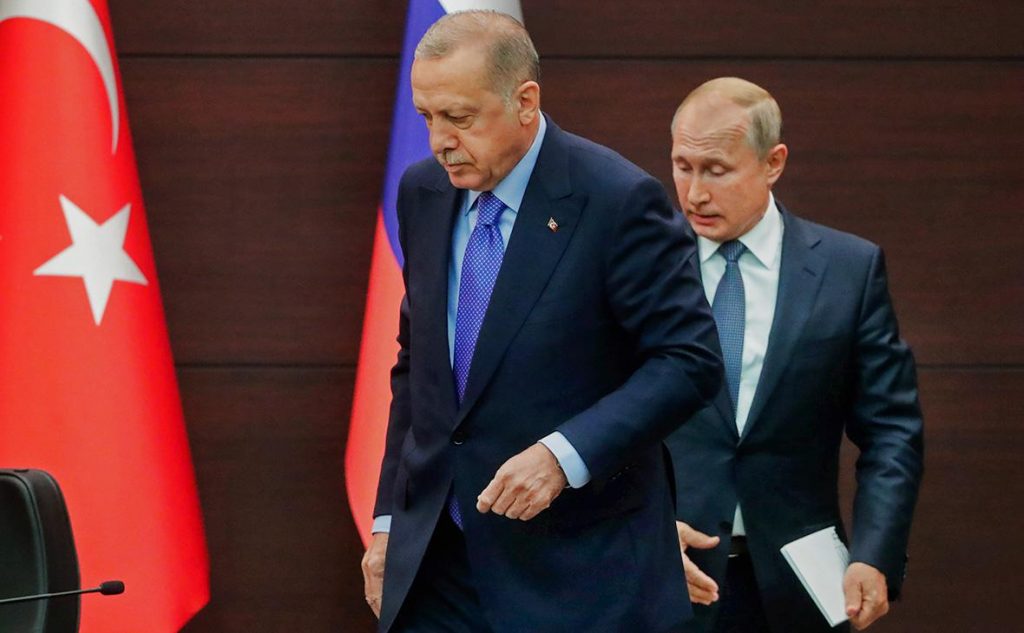
On Monday, February 26, Vladimir Putin had a telephone conversation with the President of Turkey, Recep Tayyip Erdogan. The official reason for the conversation was Erdogan’s congratulations on his 70th birthday, which he celebrated that day. According to the official press releases of the parties, Putin noted his high authority in his country and abroad, many years of government activity for the benefit of the Turkish people and, in particular, Turkey’s strengthened position in the international arena. The parties also agreed to continue contacts at various levels.
Outcomes and outlook:
The official occasion for congratulating Recep Tayyip Erdogan on his 70th birthday is also an opportunity to discuss several pressing issues that postponed Putin’s visit to Turkiye. First of all, these are issues related to the intersection of the positions of the two countries in Syria, the South Caucasus and Ukraine. Moreover, Putin is still planning his visit to Ankara – presumably on April 10.
- Meeting of Vladimir Putin with the head of Karachay-Cherkessia Rashid Temrezov
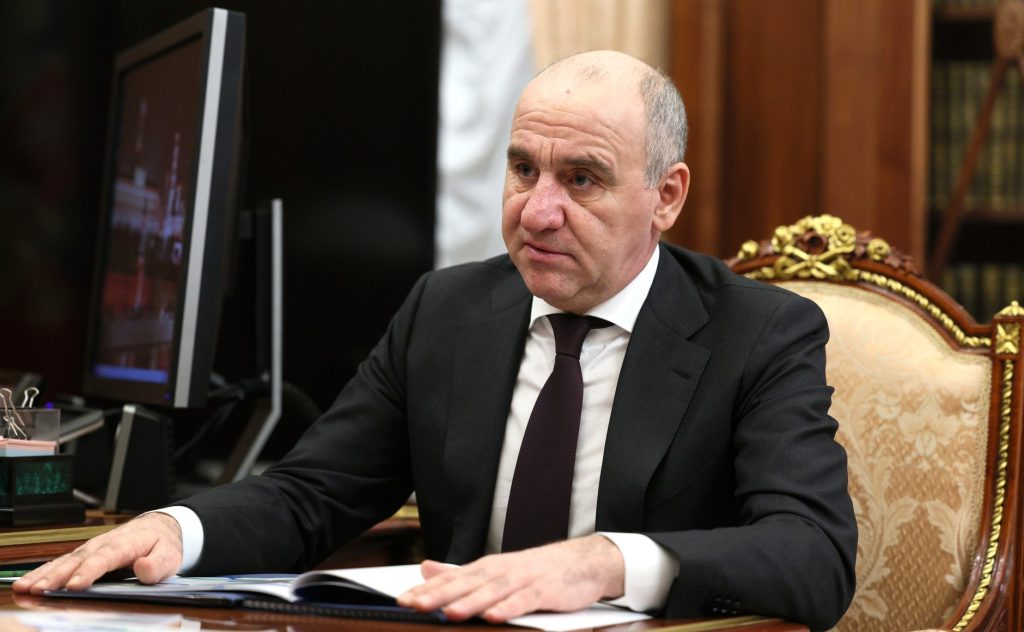
On Monday, February 26, a working meeting between Vladimir Putin and the head of Karachay-Cherkessia Rashid Temrezov took place in the Kremlin. According to official statements, the region’s socio-economic development was discussed during the meeting. Notably, Putin never included the Caucasus regions in his election tour and preferred to meet with their leaders in the Kremlin.
Key theses:
- Putin: “In the republic as a whole, the situation is quite, let’s say modestly, satisfactory. The volume of industrial production is growing, agricultural products are produced in larger volumes. Unemployment is declining; it has dropped significantly – to five per cent. It is, of course, still two, one and a half times more than the national average, but still it has decreased by almost half. This is a noticeable moment.”
- Temrezov: “Firstly, almost every third family in our country has many children. Three generations can live in one house: grandparents, grandchildren, children. The republic is the sixth in the Russian Federation regarding life expectancy. Of course, the pandemic had its impact. But your instructions – “80 plus” by 2030 – we are strictly working with the Government of the Russian Federation. And I think we will also have results in this regard.”
- Temrezov: “And special words of gratitude: at the last meeting, I asked you to support us; we have the only large drama theatre in the republic. The Republican Center was without a theatre for ten years, closed due to accidents. This year, together with the Government of the Russian Federation, we are starting its construction. This is an important event for the republic.”
Outcomes and outlook:
Rashid Temrezov, who has headed Karachay-Cherkessia since 2011, is considered among the candidates for promotion – he is one of those heads of regions for which Putin had no particular comments. Moreover, he managed to make the resource-poor region a leader in the North Caucasus. Temrezov has avoided the temptation to enter into any political alliances in the sensitive region. That is why we will most likely see him among those who will form a new management team after the presidential elections.
- Address of the President to the Federal Assembly
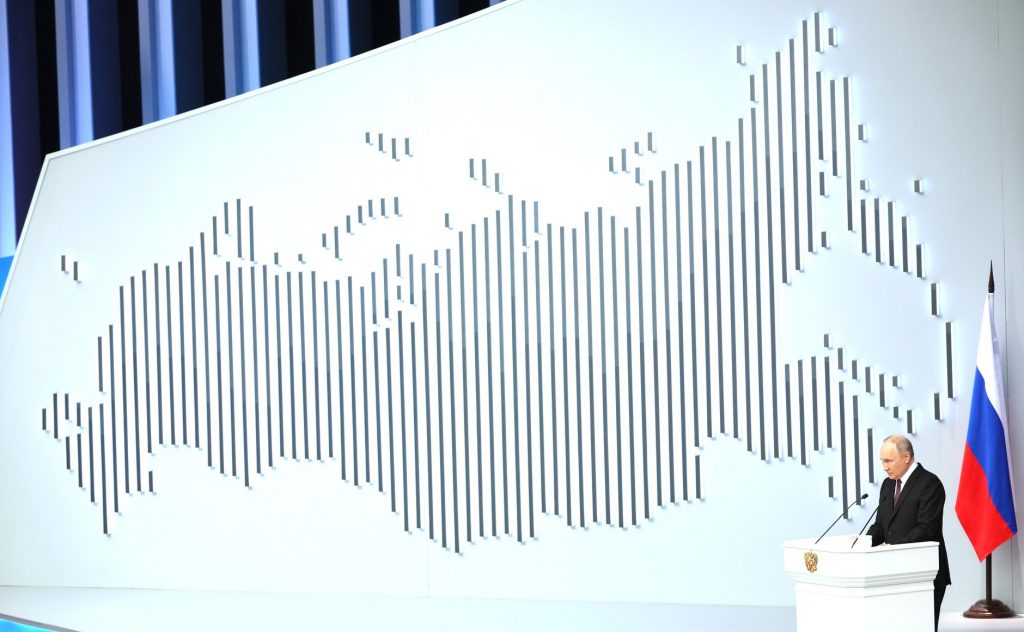
On Thursday, February 29, Vladimir Putin delivered his annual Address to the Federal Assembly. In fact, it was a yearly Address and an announcement of Putin’s election program and his program of action for the next six years. Putin’s speech was one of the longest, lasting 2 hours, 6 minutes 38 seconds. Putin broke the record for the longest speech with a message – in 2018, he spoke for 1 hour and 55 minutes.
At the very beginning of his speech, Putin said that the message was based, among other things, on communication with people from the regions and members of the so-called “Special Military Operation” and on the opinions of expert forums. The main emphasis was on unity, unity, and the unity of the entire people. It is no coincidence that the Russian president said the country faces significant challenges that can only be achieved together.
Ascolta has already analysed the main theses of the message, as well as possible further outputs: https://www.ascolta.org/?p=6243
- Meeting with permanent members of the Security Council
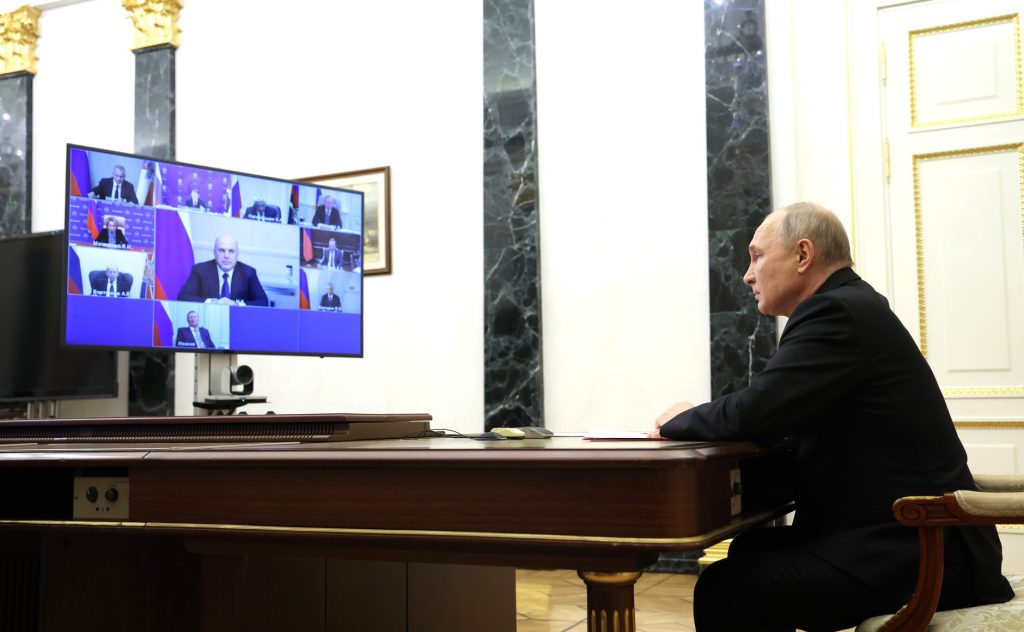
On Friday, March 1, Vladimir Putin held a regular meeting with permanent members of the Security Council via video conference. According to official information, the main topic of the meeting was the space sector and the neutralisation of threats that may arise for Russia in this direction. In particular, Putin once again recalled Western statements about Russia’s attempts to place nuclear weapons in space while stating that Moscow has no such plans.
The main speaker at the meeting was Defense Minister Sergei Shoigu. Also taking part in the meeting were Prime Minister Mikhail Mishustin, Chairman of the Federation Council Valentina Matvienko, Chairman of the State Duma Vyacheslav Volodin, Deputy Chairman of the Security Council Dmitry Medvedev, Head of the Presidential Administration Anton Vaino, Minister of Internal Affairs Vladimir Kolokoltsev, Director of the Federal Security Service Alexander Bortnikov, Director of the Service foreign intelligence Sergei Naryshkin, as well as the special representative of the President on environmental issues, ecology and transport Sergei Ivanov.
Outcomes and outlook:
The space theme was chosen for a reason. Russia is indeed preparing for a breakthrough in its space programs – even if the project to place nuclear weapons in space, which the US accuses Russia of having, turns out to be a bluff. Space programs and the transfer of confrontation into space, as well as the placement in low-Earth orbit of equipment that allows influencing the situation on earth, is an essential element of the immediate agenda for Russia. We could also discuss the problems of military aviation (and in Russia, the aviation and space industries – in military terms – intersect and form a single whole). Moreover, over the past week, Russia lost at least five aircraft (according to reports from the Ukrainian side, not confirmed by other data – 7).
- Telephone conversation between Vladimir Putin and the President of Kazakhstan Kassym-Jomart Tokayev
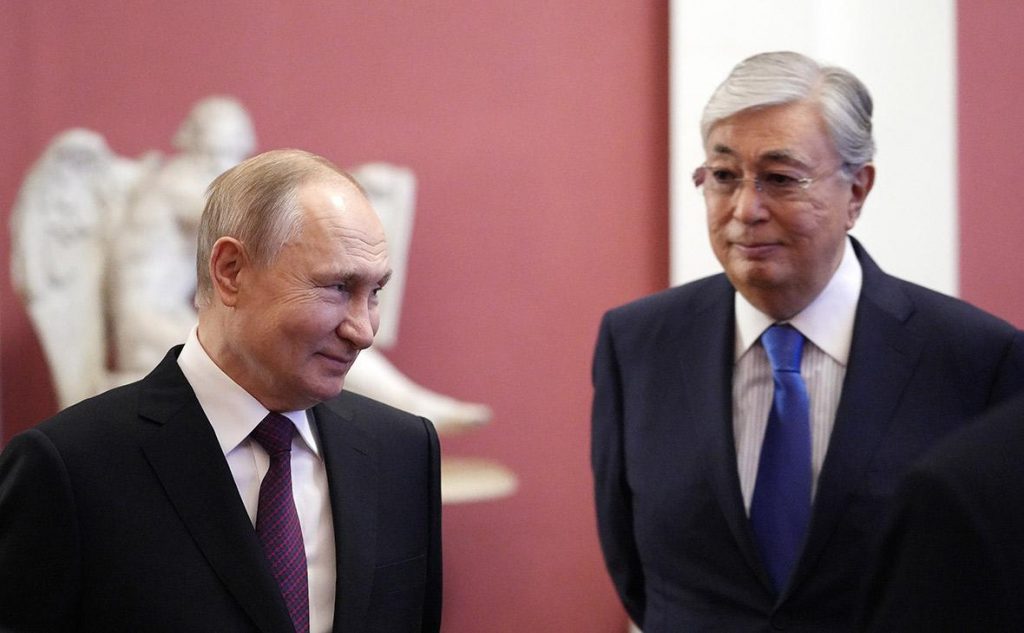
On Saturday, March 2, Vladimir Putin had a telephone conversation with the President of Kazakhstan Kassym-Jomart Tokayev. According to the parties’ statement, during the discussion, some issues on the bilateral agenda were discussed, emphasising the implementation of joint projects in the trade, economic, transport, logistics and energy spheres. The mutual commitment to comprehensively strengthening relations of alliance and strategic partnership between Russia and Kazakhstan was also confirmed.
Outcomes and outlook:
Tokayev is today one of Putin’s most important allies, and he has an important function: he acts as a de facto mediator and lawyer for Putin in negotiations with the West. It is quite possible that the call to Tokayev was a signal that Putin has specific proposals to Western (primarily American) elites. Moreover, the call was a consequence of previous events: Vyacheslav Volodin’s visit to Riyadh – Vladimir Zelensky’s visit to Riyadh – and Vladimir Zelensky’s visit to Tirana (to meet with representatives of the US and EU).
- Telephone conversation between Vladimir Putin and President of Belarus Alexander Lukashenko
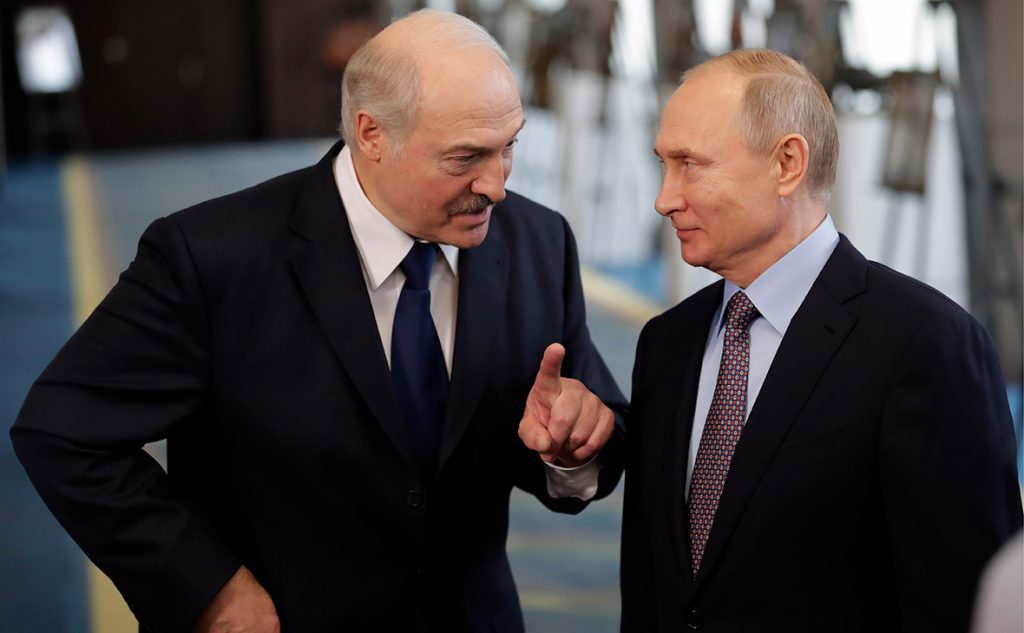
On Saturday, March 2, Vladimir Putin spoke with the President of Belarus, Alexander Lukashenko. According to the parties’ statement, the reason for the conversation was the congratulations of the Russian President voiced in honour of the successful parliamentary elections in Belarus, which took place on February 25. It is also noted that during the conversation, topical issues of the further development of friendly Russian-Belarusian relations based on the principles of alliance and strategic partnership, as well as key aspects of the international situation, were discussed in detail.
Outcomes and outlook:
Putin’s call is actually Russia’s recognition of the results of the elections held in Belarus on February 25, 2024. It is obvious that both Russia and Belarus are satisfied with the results of the elections, and soon, we will work in the same mode that has been observed in recent years.
- Disbandment of the Western and Southern Military Districts of the Russian Federation
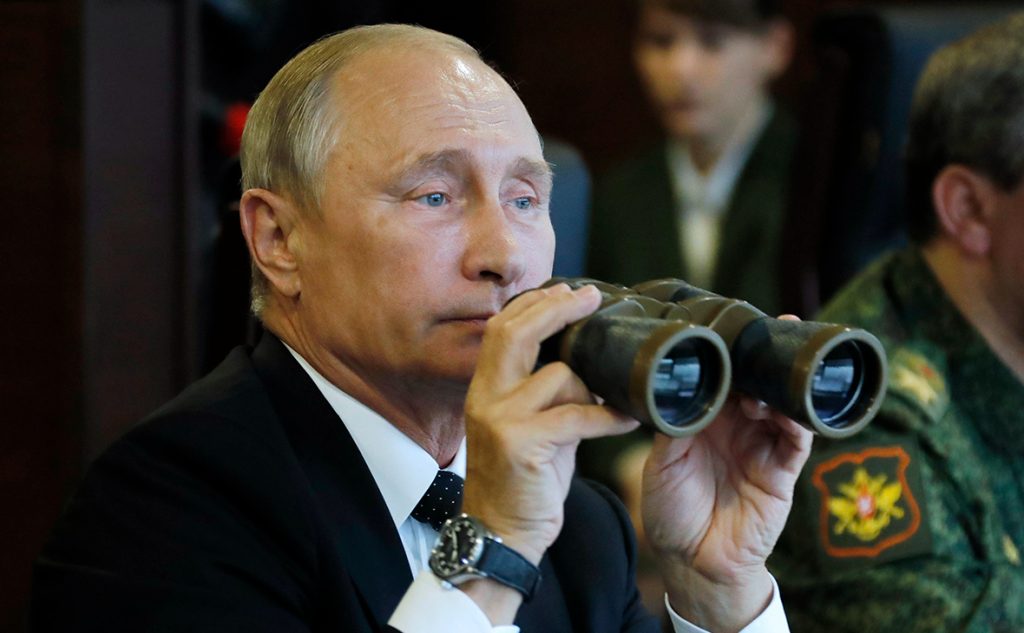
On Monday, February 26, Vladimir Putin signed an official decree on disbanding the Western Military District of the Russian Federation. Instead, the President of the Russian Federation reestablished the Moscow and Leningrad military districts that existed in Soviet times. Also, by his decree, Putin expanded the Southern Military District, including the occupied Ukrainian territories of Donetsk, Lugansk, Zaporizhzhia and Kherson oblasts.
Outcomes and outlook:
The idea of reforming the military-administrative system in Russia arose in the summer of 2022; it was announced long ago. The main task of the reform is to bring the Russian troops into line with the challenges that have arisen on the western borders. Thus, due to the entry of the Scandinavian countries (primarily Finland, which previously declared its neutrality) into NATO, the influence of the North Atlantic Alliance is increasing, which requires the creation of a separate military district (Leningrad). The Moscow Military District will respond to the threat to Russia and Belarus from Poland and the Baltic countries and partly from Ukraine. In essence, with these decrees, Putin demonstrates his readiness for further militarisation and keeping the level of tension in relations with the West.
- Meeting of Sergei Lavrov with the Minister of Foreign Affairs of Slovakia Juraj Blanar
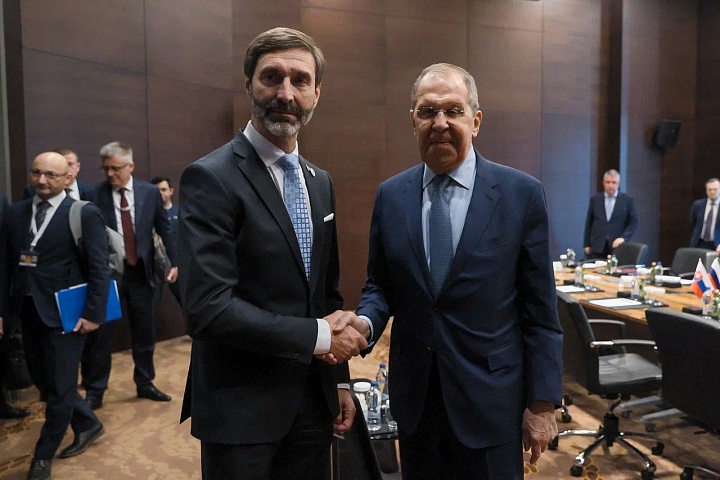
On Saturday, March 2, Russian Foreign Minister Sergei Lavrov, within the framework of the Antalya Diplomatic Forum, held his first working meeting with Slovak Foreign Minister Juraj Blanar. During the meeting, the parties exchanged complimentary statements and discussed bilateral relations between Moscow and Bratislava.
Key theses:
- Lavrov: “Nice to meet you. We are observing the formation of a new Government in Slovakia and the country’s foreign policy’s return to national interests. We prefer to work with states where the elected government puts national interests at the forefront (as Slovakia, Hungary, and many others do). We respect that.”
- Lavrov: “We understand that in addition to the fact that Slovakia is a sovereign state, it is a member of institutions such as the EU and NATO, and this is fraught with some difficulties. In this regard, we appreciate even more the ability of Prime Minister Robert Fico and his government to have their own opinion on the situation in the world.”
- Lavrov: “We count on the resumption of interparliamentary relations. Both our houses of parliament have never closed themselves off from such contacts. There is a cooperation group with Slovak legislators. As far as I know, this work was suspended or completely stopped in your parliament. The Speaker of the State Duma of the Federal Assembly of the Russian Federation, Vyacheslav Volodin, has a long-standing relationship with the Deputy Chairman of the National Council of Slovakia, Mr. Danko (including during his work in other posts).”
Outcomes and outlook:
Juraj Blanar is a long-time advocate for improving relations between Slovakia (and the EU) and Russia. Since Slovakia is a member of the EU and NATO, strengthening connections between Moscow and Bratislava is essential to Russian foreign policy. Now, Russia has two states that can develop an agenda beneficial to Moscow – Hungary and Slovakia. Soon, Slovakia may receive several proposals of a strategic economic nature from Russia.
- Participation of Sergei Lavrov in the Antalya Diplomatic Forum
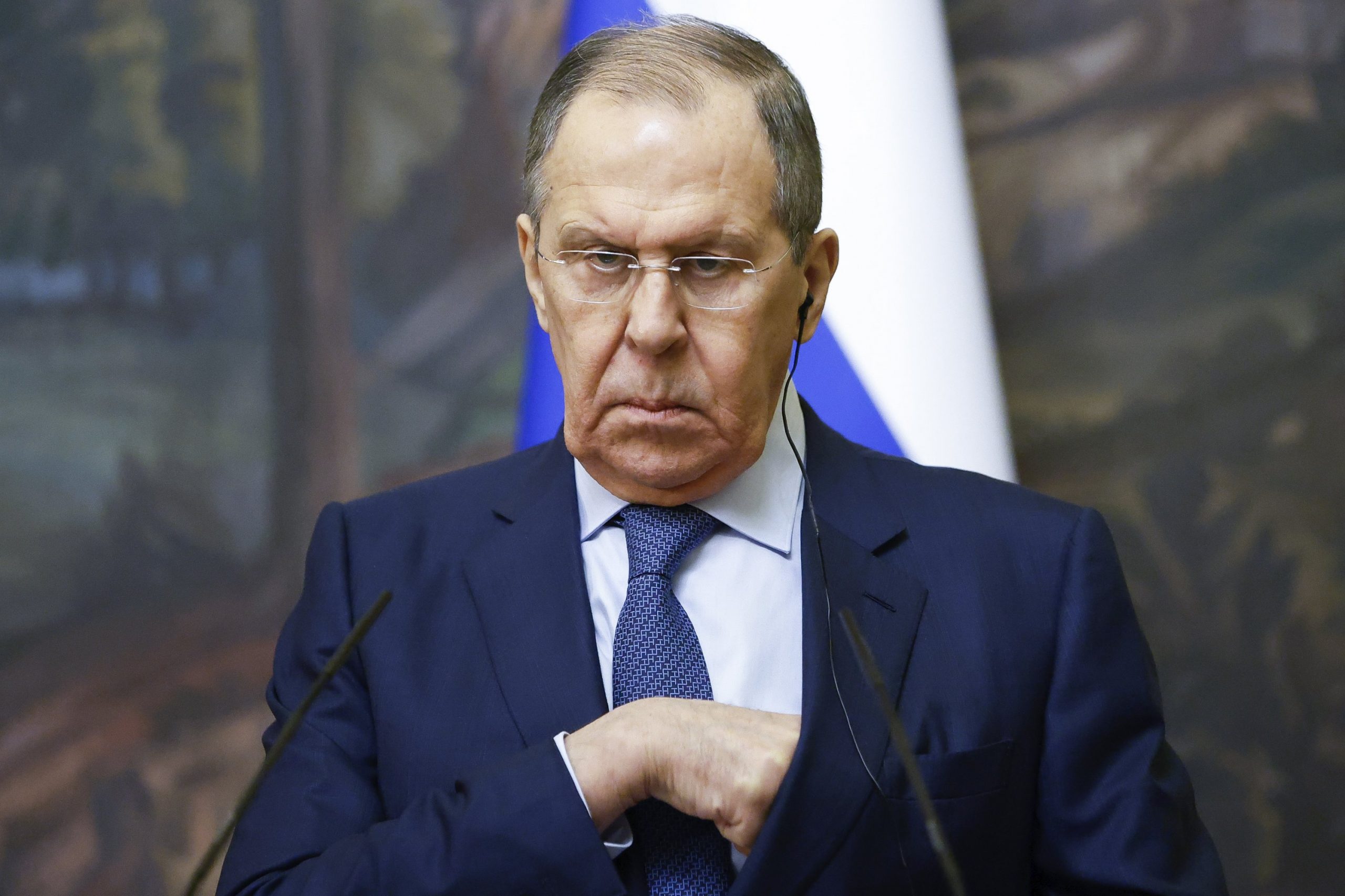
On Saturday, March 2, Russian Foreign Minister Sergei Lavrov took part in the traditional Antalya Diplomatic Forum. It was held on the initiative of Turkish President Recep Tayyip Erdogan. During the Forum, Lavrov also held several bilateral meetings. At the end of his stay in Türkiye, the head of the Russian Foreign Ministry took part in a press conference and answered questions from journalists.
Key theses:
- “Last year, unfortunately, we could not meet due to the devastating earthquake in Turkey, which required the concentration of all efforts to overcome its consequences and help the victims. Russia was then among the first countries to lend a helping hand. We sent search and rescue teams and construction materials and humanitarian assistance.”
- “We took advantage of our participation in the conference and held special panel sessions with my participation, where we attracted the attention of the international community to the consequences of the line pursued by the “collective West”, led by the United States, in open disregard for the principles of the UN Charter. First is the principle of respect for the sovereign equality of all states.”
- “The West is using the current international situation to push through the “rules” on which, according to them, the world order should be based and which, when you start to analyse them, only mean the desire to continue to act in neocolonial ways, to live at the expense of others. We also see this in the events unfolding in Europe, the Middle East, East Asia, including the East China Sea and other regions of the world.”
- “We are convinced that the World Majority, which is increasing its weight in every sense – in the world economy and politics, understands the need to return to the roots and to the principles of the UN laid down by the founding fathers, which the West is now simply not only ignoring, but also rudely violates.”
- “We confirm once again (the question has been asked dozens of times) that Russia has never refused negotiations. An example of this is the Istanbul agreement of April 2022. As the chief Ukrainian negotiator, head of the Servant of the People party faction in the Verkhovna Rada David Arakhamia admitted, British Prime Minister Boris Johnson, having arrived in Kyiv, forbade the “regime” of Vladimir Zelensky to implement these agreements and told them to continue fighting.”
- “We have no lack of goodwill. We see his absence from the other side. Not so much goodwill as a lack of understanding of what is happening. On that side, we continue to note the desire to achieve Russia’s defeat “on the battlefield.”
- “There are plenty of facts that the West is leading the matter towards a military solution. Even though even more facts show such a course’s complete failure and dead-end. But with a tenacity worthy of better use, they continue to pursue their aggressive line.”
- “Look at the list of American adventures over the past 50 years – Vietnam, Afghanistan, Iraq, Libya, Syria. Where did it get better? States have been destroyed, and the socio-economic well-being that was a characteristic of, say, the Libyan Arab Jamahiriya has been destroyed. Where have the goals declared by Washington and its allies been achieved?”
- “Germany is changing. Several years ago, long before the [so-called] “special military operation” before the Bundeswehr officers talked about how to bomb Russia, I had the opportunity at one of the press conferences to share our assessments of the evolution of the positions of the German elites. This was around the time when, under US pressure, the Nord Stream gas pipelines that had not yet been blown up were not put into operation, their activation was postponed, and it was clear to everyone that the Americans wanted no gas to flow through these routes at all.”
- “Westerners are now discussing whether the main amount that was seized should not be confiscated due to possible precedents. The Western judicial system may not have completely lost its conscience and may rule in favour of Russia. They come up with various modifications for theft. They say, let’s not touch these billions; we “spin” these funds in our banks, but we will get a profit and take it for ourselves. It’s still theft. This is clear to everyone.”
- “US Secretary of State Antony Blinken is now engaged in diplomacy – travelling throughout the Middle East several times over the past five months. Behind-the-scenes meetings are held with the Americans’ participation (either in Paris, then in Doha, or elsewhere in the region). In different combinations, Egyptians, Jordanians, Saudis, Qatar, and UAE are attracted there. All this is done in a rather non-transparent manner. The leaked information shows one thing – this is not at all about eliminating the causes of periodic outbreaks of violence in the Palestinian territories and in the Middle East as a whole. As I understand it, they are developing a plan for a ceasefire, at least for a while, how many hostages to exchange for how many Palestinians are in Israeli prisons, and how to deliver humanitarian aid. Yes, it is important”.
- “The Arab countries have made it clear to the Americans that they will not invest money in the reconstruction of Gaza if they again drag out the task of creating a Palestinian state. According to our data, the Americans and some other Western countries are now toying with the idea of simply announcing that Palestine has become the 194th member of the United Nations. Palestine will have a permanent representative with all the same rights as other UN members. A beautiful “announcement” to thereby divert attention to the propaganda effect. “On earth” try to leave everything as it is.”
- “We are convinced that a Palestinian state is not a whim, not just a UN decision that was once made. Without its implementation, it is impossible to stop the violence in the Middle East, to calm the Arab “street”, which sees injustice and how they are trying to perpetuate this injustice.”
Outcomes and outlook:
For Sergei Lavrov, participation in such a forum is an opportunity to demonstrate once again that Russia is not in complete isolation. Each meeting and communication with journalists is an information breakthrough for Russian diplomacy. In any case, Russia used this platform. It once again declared itself as a player in the Middle East processes, with its own vision of the situation and recipes for overcoming the crisis. Lavrov also decided to promote once again the thesis “Russia is the flagship of the fight against neo-colonialism.” He spoke somewhat disparagingly about France’s ability to influence the course of events in Ukraine. An important point was Lavrov’s communication with Foreign Minister of Türkiye Hakan Fidan –immediately after the conversation, Mr. Fidan voiced Turkey’s official point of view on the situation around Ukraine. He said that Turkey insists on a ceasefire and a transition to negotiations between Russia and Ukraine. Previously, Türkiye stated that it was ready to provide opportunities for the negotiation process.

